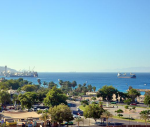You are here
Kerry’s untenable framework plan
Jan 04,2014 - Last updated at Jan 04,2014
The American Secretary of State John Kerry had the main core of his peace plan leaked to the press.
According to what was circulated in more than one capital, sovereignty over East Jerusalem will pass to an international commission comprising the United States, Israel, the Palestinians, Jordan and Saudi Arabia.
Such a proposal will not be conducive to peace in this holy place with its unique concentration of holy shrines for the three monotheistic faiths.
Though geographically, the area of this holy basin is no more than 0.04 per cent of the West Bank, the significance, value and religious attachment of millions of believers to those symbols of man’s relationship to the deity cannot be measured by metres.
No party to the conflict would reject the legality of the Jordanian custodianship of the holy sites, since it has been accepted for decades, but many Iranians will be critical of any role for other Muslim countries.
Tehran will for sure question the reasons for excluding 222 million Shiites from any representation in administering what they consider their second holiest shrine after Mecca. The same might apply to Yemen’s Yazidis who have their different theology from the Jaafari Shiites.
Even the Catholic Church has its different views regarding the best way to run the administrative sovereignty on the churches. When Pope Francis arrives here next May, he will have on his agenda this issue that should be negotiated with the Jordanians and Israelis.
No doubt, the Orthodox churches will formulate an appeal to Moscow to have President Vladimir Putin make his presence felt in East Jerusalem, as he had forced his way in Syria and Cairo. It would be a shortcut to have the Russian Orthodox Church reclaim for Russia the role the Soviet Union lost in the region decades ago.
It is clear that Kerry’s proposed framework, which is supposed to be serving as a guideline for addressing all core issues between Palestinians and Israelis, was formulated years before the new changes in our region.
What would have been tolerated years ago by decision makers in Ramallah and other Arab capitals will never be accepted now that the region is about to be diametrically radicalised, with 60,000 militant jihadists fighting in Syria, including 2,000 of them Palestinians and Jordanians, belonging to the most extreme of Islamic fanatics.
That new generation of Palestinians will not tolerate the concept of a land swap between Israel and the future state, even if it is part of a deal in which Ramallah will have 92.8 per cent of West Bank territory, while Israel annexes 6.8 of the land to accommodate the six main Jewish settlements with their over 600,000 armed settlers.
It is the same proposal that was brokered by president Bill Clinton and Ehud Barak on July 25, 2000, and was immediately rejected by Yasser Arafat on the grounds that the 1.7 million Palestinians living in Israel since 1948 have to be consulted before determining their future.
For sure, the strain in relations between Israeli Prime Minister Benjamin Netanyahu and US President Barack Obama, following the Iranian nuclear issue last month, will reflect on Kerry’s efforts to find a final solution to this impasse.
But a solution such as that he is suggesting now will result, undoubtedly, in more radicalised Palestinians who could start a third Intifada, whose flames will reach other capitals, and all hopes for a peaceful region will evaporate.
The American secretary of state would have saved himself the dreadful fall into an oriental labyrinth if he had confined membership for the international commission on Jerusalem to the three parties directly involved in the issue.












